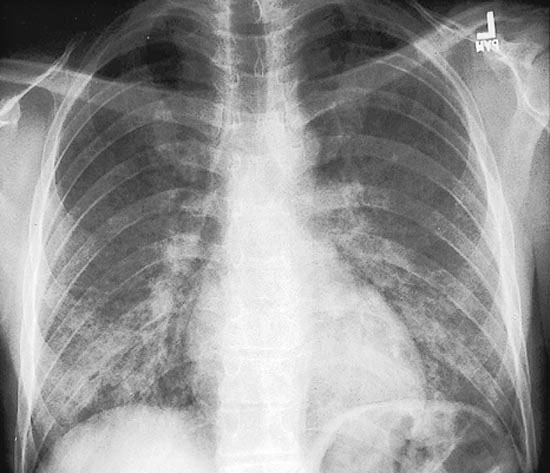What's in this article?
What is Pneumonia?
Pneumonia is an infection in one or both of your lungs that can be caused by several kinds of germs, such as: Bacteria; viruses; fungi (molds) (uncommon). It can have more than 30 different causes.
Approximately one-third of the pneumonia cases in the United States each year are caused by respiratory viruses. These type of viruses are the most common cause of pneumonia in children and young adults.
The flu virus is the most common cause of viral pneumonia in adults. Some viruses that cause pneumonia include respiratory syncytial virus, herpes simplex virus, rhinovirus, severe acute respiratory syndrome (SARS) virus and many more.
read more: What are the Symptoms of Pneumonia?
Causes of Pneumonia
Pneumonia has many possible causes. The most common are bacteria and viruses in the air we breathe. Your body usually prevents these germs from infecting your lungs. But sometimes these germs can overpower your immune system, even if your health is generally good.
Four main causes of pneumonia:
- Bacteria– such as Streptococcus pneumoniae. Bacterial community-acquired can occur on its own or after you have a cold or respiratory flu.
- Viruses– including some that are the same type of viruses that cause colds and flu. Viruses are the most common cause of pneumonia in children younger than 2 years.
- Fungi– which can be found in soil and in bird droppings. This type of pneumonia is most common in people with an underlying health problem or weakened immune system and in people who have inhaled a large dose of the organisms.
- Bacteria-like organisms– such as Mycoplasma pneumoniae, which typically produce milder signs and symptoms than do other types of pneumonia.
read more: Pneumonia: Facts and Overviews
Symptoms of Pneumonia
Symptoms of pneumonia caused by bacteria usually come on quickly.
They may include:
- Cough. You will likely cough up mucus (sputum) from your lungs. Mucus may be rusty or green or tinged with blood.
- Fever.
- Fast breathing and feeling short of breath.
- Shaking and “teeth-chattering” chills. You may have this only one time or many times.
- Chest pain that often feels worse when you cough or breathe in.
- Fast heartbeat.
- Feeling very tired or feeling very weak.
- Nausea and vomiting.
- Diarrhea.
read more: Pneumonia Types and Causes
What is HIV?
HIV is a virus that attacks the immune system, which is our body’s natural defence against illness. The virus destroys a type of white blood cell in the immune system called a T-helper cell, and makes copies of itself inside these cells. T-helper cells are also referred to as CD4 cells.
As HIV destroys more CD4 cells and makes more copies of itself, it gradually breaks down a person’s immune system. This means someone living with HIV, who is not receiving treatment, will find it harder and harder to fight off infections and diseases.
If HIV is left untreated, it may take up to 10 or 15 years for the immune system to be so severely damaged it can no longer defend itself at all. However, the speed HIV progresses will vary depending on age, health and background.
read more: Characteristics of HIV Rash
Causes of HIV
HIV is a retrovirus that infects the vital organs and cells of the human immune system.
The virus progresses in the absence of antiretroviral therapy (ART) – a drug therapy that slows or prevents the growth of new HIV viruses.
The rate of virus progression varies widely between individuals and depends on many factors;
These factors include the age of the patient, the body’s ability to defend against HIV, access to healthcare, existence of other infections, the infected person’s genetic inheritance, resistance to certain strains of HIV, and more.
read more: HIV rash in men
Symptoms of HIV
HIV may not cause symptoms early on. People who do have symptoms may mistake them for the flu or mono. Common early symptoms include:
- Fever.
- Sore throat.
- Headache.
- Muscle aches and joint pain.
- Swollen glands (swollen lymph nodes).
- Skin rash.
Symptoms may appear from a few days to several weeks after a person is first infected. The early symptoms usually go away within 2 to 3 weeks.
After the early symptoms go away, an infected person may not have symptoms again for many years. After a certain point, symptoms reappear and then remain. These symptoms usually include:
- Swollen lymph nodes.
- Extreme tiredness.
- Weight loss.
- Fever.
- Night sweats.
read more: HIV/ AIDS and Pregnancy: Overview of Transmission
Difference Between Pneumonia and HIV
HIV attacks the body’s immune system, specifically the CD4 cells (T cells), which help the immune system fight off infections. If left untreated, HIV reduces the number of CD4 cells (T cells) in the body, making the person more likely to get infections or infection-related cancers. Over time, HIV can destroy so many of these cells that the body can’t fight off infections and disease. While the Pneumonia is an infection in one or both of your lungs that can be caused by several kinds of germs, such as: Bacteria; viruses; fungi
read more: Difference Between HIV Rash and Herpes






Leave a Comment